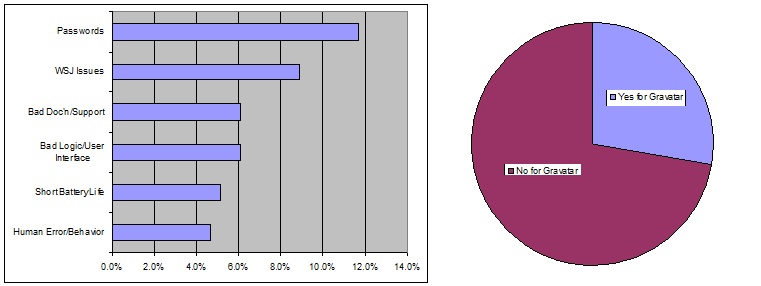Two of The Journal’s technology writers led off with their own “Dirty Dozen” of most annoying technology failures in the March 11, 2015 issue, then followed up a week later with their analysis of readers’ comments. Thanks to our long background in surveys and statistics we at Technology Bloopers are well aware of the limitations of this data, but its high-level source and its “essay” type answers (as opposed to the all-too-frequent cookie cutter “multiple choice” questionnaires that flood everyone daily) were too tempting to pass up. (Note: Some commenters provided two or more unrelated comments, and we counted them separately, so strictly speaking the data we analyzed was about comments, not commenters.) We well realize that the sample is highly biased, but it is a very useful sort of bias; these commenters should be somewhat more knowledgeable, more powerful, and more well-paid than a random sample. So their comments, thoughtfully analyzed, should be very useful. But we can even further separate the comments into above-average and below-average knowledgeability by whether or not their comment was accompanied by a “gravatar” (i.e., “global avatar”, the little picture they use as a graphical representation of their Web presence, kind of an online logo). We were surprised that only about 28% of the responses came from the below-average-knowledge group.
The charts immediately tell a lot of the story: Passwords are the #1 most annoying technology failure (and this is true whether we’re talking about the whole group or only the above-average-knowledge subgroup). The combined complaints about the Wall Street Journal itself (bad technical support, bad advertising, bad comment system, bad mobile device app, and bad website) was #2 for the group as a whole but was mainly for the below-average-knowledge subgroup. Bad documentation/(technical) support and bad logic/user interface tied for #3, but the former had numerous above-average-knowledge commenters while the latter had very few. Two other annoyances that fell just below the top 6 shown in the chart were “Too Complex” and “Facebook is Not Essential”.

